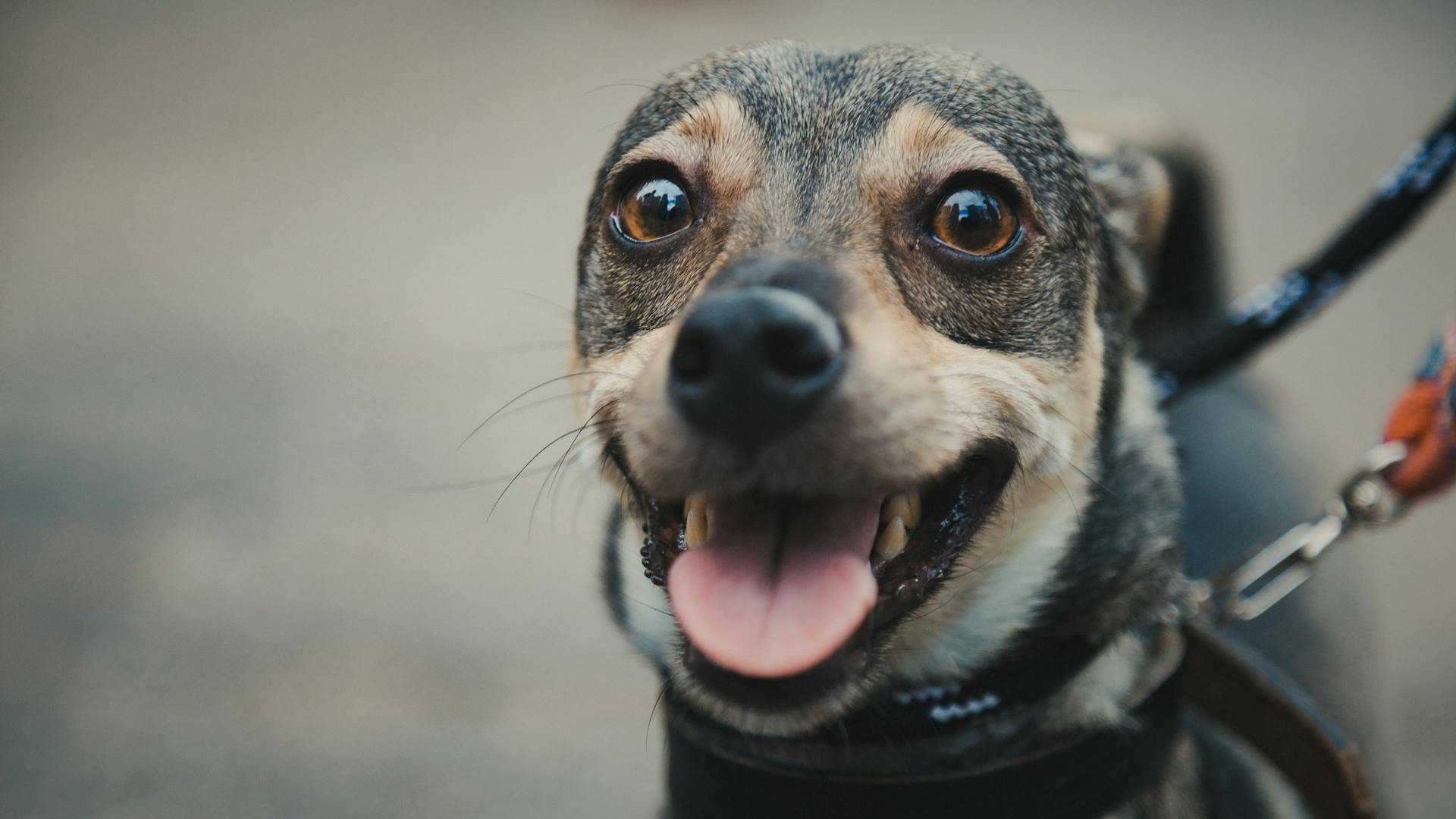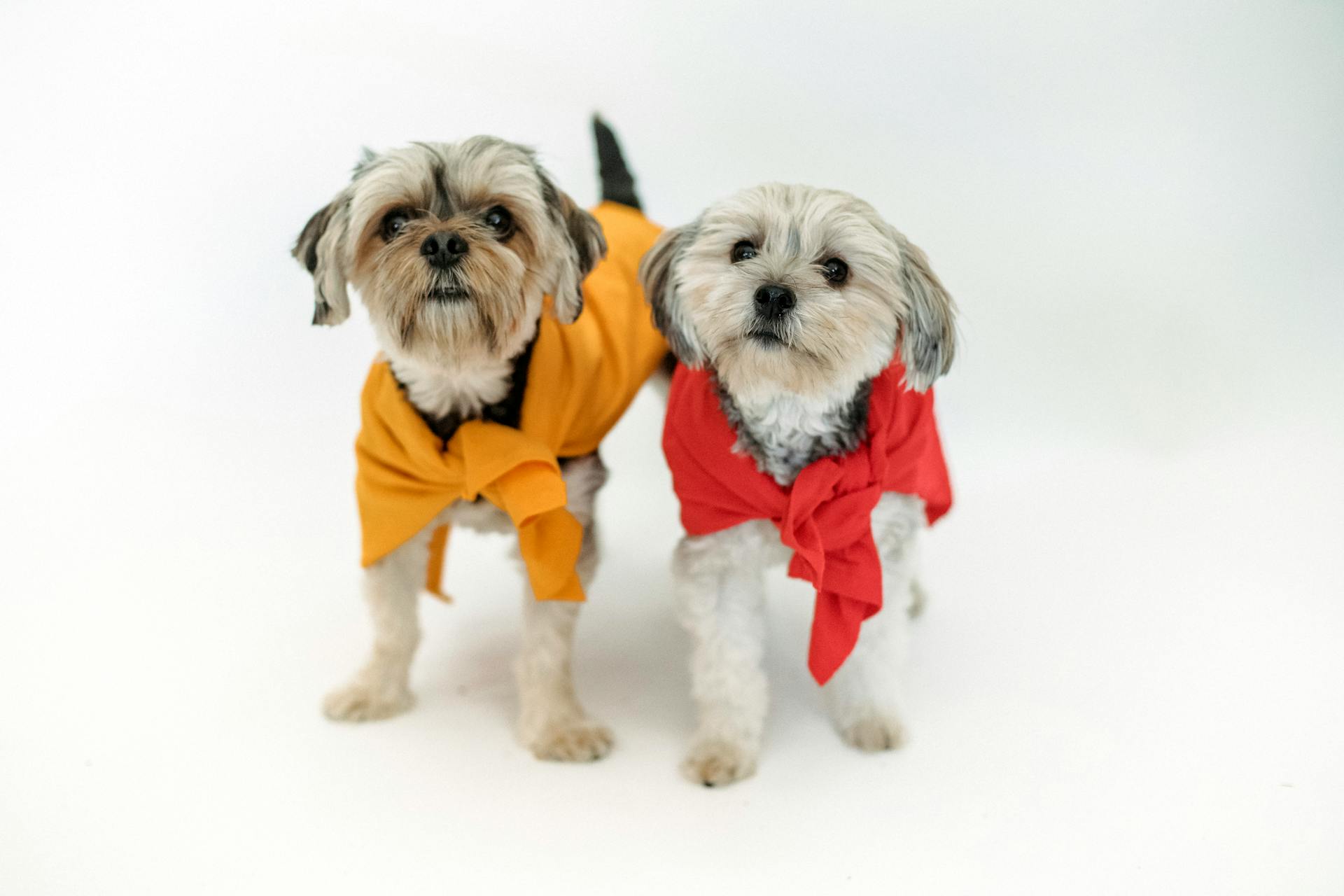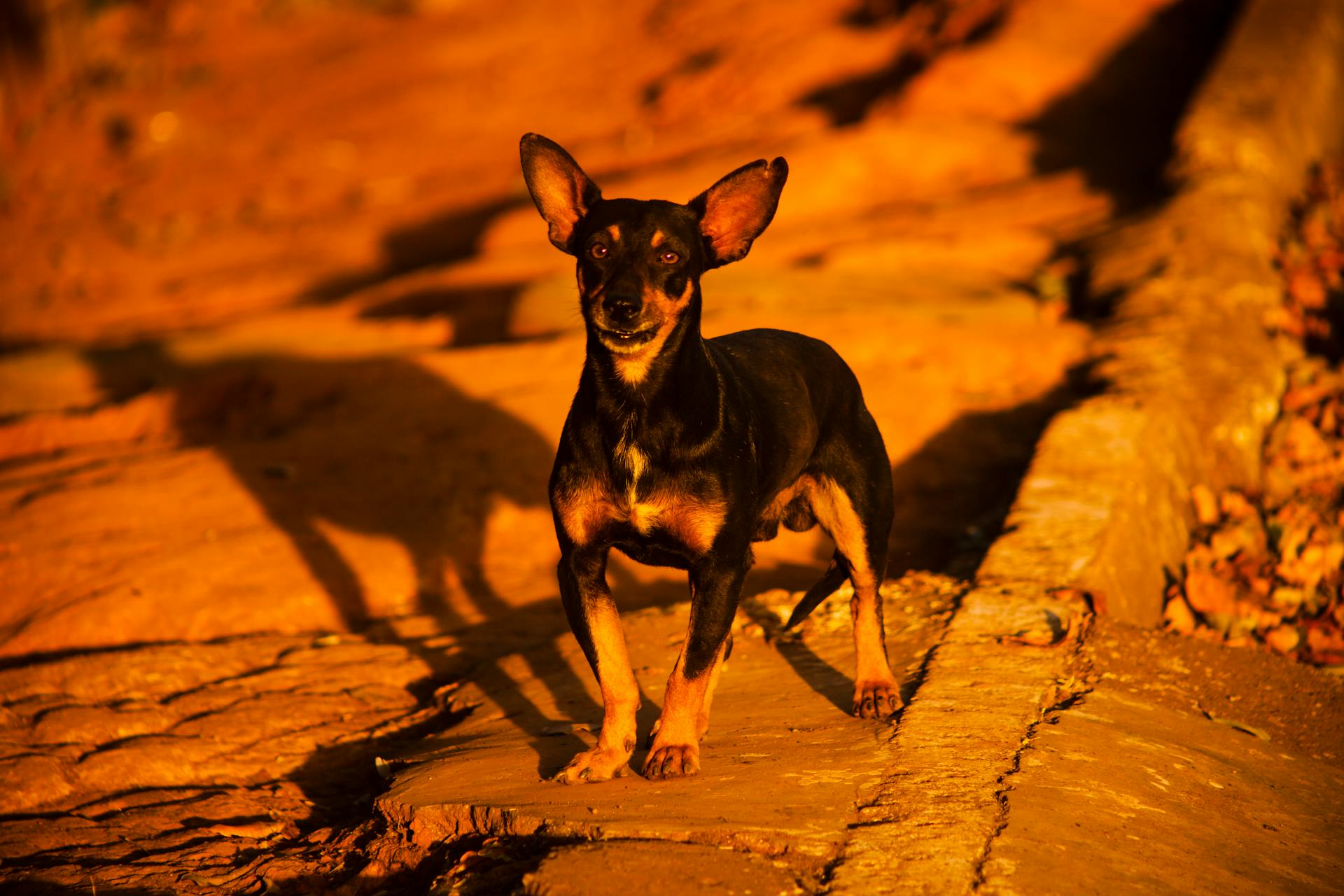
Min Pin puppies are a bundle of energy and joy, but they require attention and care to thrive.
Housebreaking can be a challenge, especially for first-time owners, but consistency and positive reinforcement can help.
Min Pins are intelligent and trainable, but they can be stubborn at times, so patience and consistency are key.
They need regular exercise, such as short walks and playtime, to stay happy and healthy.
General Information
Miniature Pinscher puppies are a great choice for families who live in apartments or travel frequently, as they are small in size and don't require a lot of space.
Mini Pins are lively and fun companions, known for their boundless energy and spirited personality. They are also intelligent dogs that respond well to training, especially when provided with positive reinforcement methods.
Their short coat is easy to groom and requires minimal maintenance, making them a great choice for owners who don't want to spend a lot of time on dog grooming.
Here are some key characteristics to keep in mind when considering a Miniature Pinscher puppy:
Keep in mind that Mini Pins can be wary of strangers and may become agitated if they're not socialized properly. They also tend to bark a lot, so if you live in an apartment, you may want to consider this before bringing a Mini Pin home.
Overview
The Miniature Pinscher is a fantastic breed that makes a great companion for many owners. They are small in size, making them perfect for apartments and travel.
One of the most notable characteristics of the Miniature Pinscher is their lively and fun temperament. They are known for their boundless energy and spirited personality, which makes them a joy to be around.
Miniature Pinschers are also relatively low-maintenance when it comes to grooming. Their short coat is easy to groom and requires minimal maintenance, making them a great choice for owners who don't want to spend a lot of time on grooming.
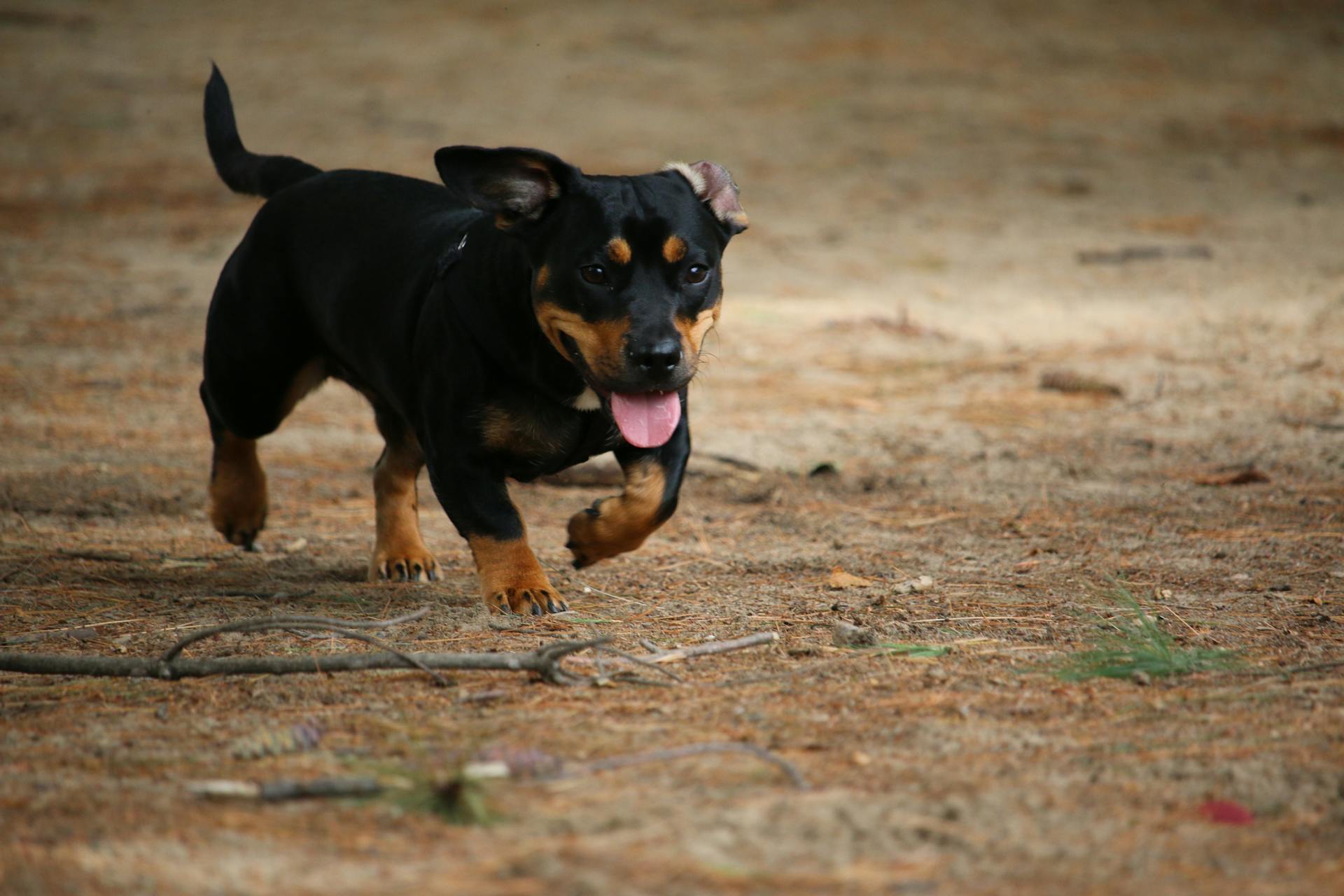
However, it's worth noting that Miniature Pinschers can be wary of strangers and may become agitated if they're not properly socialized. They can also feel threatened by small children, so it's essential to introduce them carefully.
Here are some key characteristics of the Miniature Pinscher:
- Small size, making them perfect for apartments and travel
- Lively and fun temperament
- Low-maintenance grooming
- High tendency to bark
- Wary of strangers and can become agitated
- Can feel threatened by small children
History
The Miniature Pinscher is an old breed that's been around for several hundred years. It's thought to have originated in Germany, where it was used to kill rats in homes and stables.
The breed was first called the Reh Pinscher because of its supposed similarity to the reh, a small deer that once inhabited Germany's forests. This name gives us a glimpse into the breed's early history and its connection to its German roots.
The Miniature Pinscher was developed from a combination of other breeds, including the Dachshund and Italian Greyhound. This mix of breeds likely contributed to its unique appearance and characteristics.
In Germany, the breed gained popularity between 1905 and World War I. After the war, breeders in Germany and Scandinavia worked to improve the breed's genetic line.
The first Miniature Pinschers arrived in the United States in 1919, marking the beginning of the breed's journey in America.
Health and Care
Min Pin puppies are generally healthy, but like all breeds, they're prone to certain health conditions. These can include Progressive Retinal Atrophy (PRA), a family of eye diseases that involves the gradual deterioration of the retina, and Legg-Calve-Perthes Disease, a malady that involves the hip joint.
Early socialization and training are crucial for Min Pin puppies, as they can become timid or quarrelsome if they're not properly socialized when young. You'll need to "baby-proof" the house, making sure all small objects are out of their reach, and setting up safeguards to protect them from getting into trouble.
To keep your Min Pin healthy, you should expect to see health clearances from reputable organizations such as the Orthopedic Foundation for Animals (OFA) and the Canine Eye Registry Foundation (CERF). Here are some common health issues to be aware of:
- Progressive Retinal Atrophy (PRA)
- Legg-Calve-Perthes Disease
- Epilepsy
- Hypothyroidism
- Patellar Luxation
Health Issues
Miniature Pinschers are generally healthy dogs, but like all breeds, they can be prone to certain health conditions. Their average lifespan is 12-16 years.
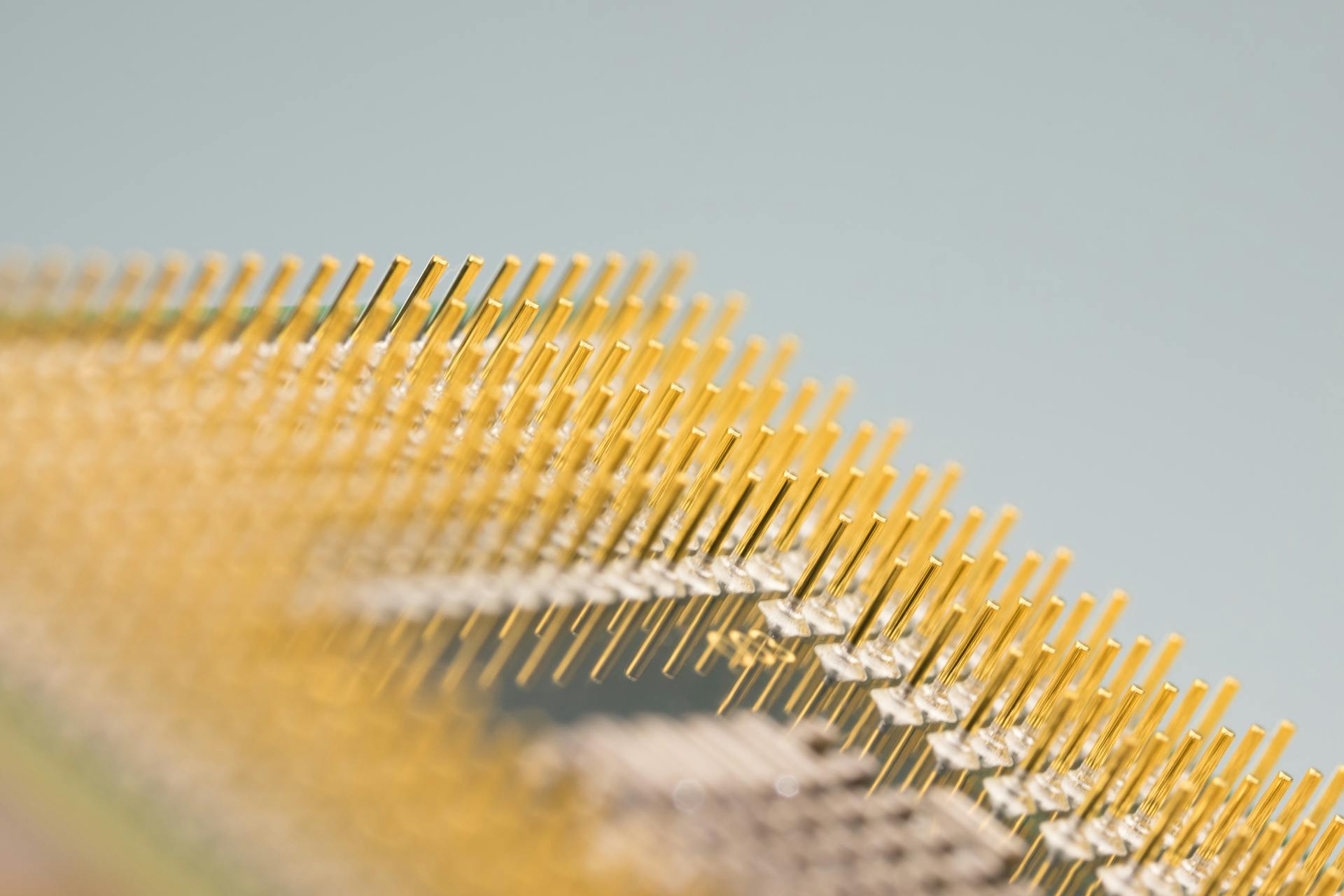
One of the most common issues is eye problems, which can be caused by conditions like Progressive Retinal Atrophy (PRA). This disease can lead to blindness, but many affected dogs adapt well to their limited or lost vision.
As a responsible owner, it's essential to be aware of the health clearances your breeder should provide. These clearances prove that the parents have been tested for and cleared of conditions like hip dysplasia, elbow dysplasia, hypothyroidism, and von Willebrand's disease.
Some Miniature Pinschers may also experience Legg-Calve-Perthes Disease, which affects the hip joint and can be corrected with surgery. This condition usually becomes apparent when puppies are four to six months old.
Epilepsy is another neurological condition that can cause seizures. While it can be frightening to watch, the long-term prognosis for dogs with idiopathic epilepsy is generally very good.
Additionally, Miniature Pinschers can be susceptible to patellar luxation, a condition where the knee joint slides in and out of place, causing pain. In severe cases, surgery may be necessary.
Here are some common health problems to be aware of in Miniature Pinschers:
- Luxating patella: This condition causes your dog's knee to pop out of place.
- Legg-Calve-Perthes disease: This orthopedic disorder causes degeneration of the hip joints.
- Progressive retinal atrophy (PRA): Affecting the retina in your dog's eyes, this condition eventually leads to blindness.
- Epilepsy: This is the neurological disease that often appears as seizures.
- Thyroid and heart problems: These issues require veterinary care and medication.
Pet Care Considerations
Miniature Pinschers are intelligent and high-energy dogs that need ample exercise and consistent training. They tend to think they're much larger than they actually are, which can get them into trouble.
To keep your Miniature Pinscher safe, you need to "baby-proof" your home by putting away small objects and securing any spaces they can fit into. This includes tables, chairs, and countertops, which a crafty Min Pin can still get to.
Medication is a serious issue with Miniature Pinschers, as they'll find and ingest any pills that are dropped on the floor. Make sure to put medication away after every use.
Your yard and fencing need to be thoroughly checked for any holes or openings, as your Miniature Pinscher can easily squeeze through them. Make sure all doors and windows, and their screens, are sturdy and secure.
Early socialization and training are crucial for Miniature Pinschers, as they can become timid or quarrelsome if they're not properly socialized when young. This will help ensure they grow up to be well-rounded dogs.
Miniature Pinschers don't have a lot of fur, making them sensitive to cold. Consider buying them a doggie sweater for cold winter months.
Explore further: What Do Puppys Need
Diet and Nutrition
As a new min pin puppy owner, you'll want to make sure your furry friend is getting the right amount of food to grow strong and healthy. Generally, a high-quality dog food will meet a min pin's nutritional needs, but it's always a good idea to consult with your vet.
Active min pin puppies need about 1 ounce of high-quality dog food per pound of body weight each day. This should be spread out over three or four meals to keep them satisfied and energized.
Puppies and young adults who get plenty of exercise may benefit from a diet rich in protein, which can help them build strong muscles. Older or less active dogs, on the other hand, may need a diet with added fiber and reduced fat to prevent weight gain.
Clean, fresh water should be available at all times for your min pin puppy. This is especially important for active dogs who need to stay hydrated throughout the day.
To determine the best meal plan for your puppy, consult with your veterinarian about a healthy diet based on your puppy's age, weight, activity level, and any allergies or health conditions.
For more insights, see: Australian Silky Terrier Weight
Grooming and Coat
The Miniature Pinscher's coat is generally easy to care for, and grooming is typically simple. Their short, smooth coat requires only occasional brushing to keep it shiny and clean.
Brushing your Min Pin about once a week will keep their fur shiny and clean, and help control any shedding in your home. This will also make grooming a positive experience for both you and your dog.
Frequent bathing is not recommended, as it can dry the skin. Instead, you can wet a washcloth with warm water and wipe your Min Pin's coat to keep them clean and healthy.
Size
Miniature Pinschers are small dogs, standing 10 to 12.5 inches high.
Their compact size makes them a great fit for city living, but they still need regular exercise to stay happy and healthy.
Males and females weigh between 8 to 11 pounds, which means they're light enough to pick up and cuddle, but still sturdy enough to keep up with your active lifestyle.
Their small size also means they have a relatively low grooming needs, but more on that later!
Grooming Guide
Miniature Pinschers have short, smooth coats that require minimal grooming.
Brushing your Min Pin's fur weekly or daily will maintain a healthy appearance. Regular nail trims, teeth brushing, and ear cleaning are also essential.
Their short coats mean they don't shed much, but occasional shedding can still occur. Brushing them a couple of times a week will help control any shedding in your home.
You'll also need to brush their teeth each day to keep up with oral hygiene. Regular brushing helps prevent tartar buildup and keeps their breath fresh.
Miniature Pinschers may need to have their ears cleaned regularly with a dog-specific ear cleanser. Signs of an ear infection include redness, odor, or if your Min Pin is scratching at his ears.
Frequent bathing is not recommended, as it can dry the skin. Instead, you can simply wet a washcloth with warm water and wipe their coat, paying attention to the face and under the eyes.
Begin accustoming your Min Pin to being brushed and examined when they're a puppy. Handle their paws frequently and make grooming a positive experience filled with praise and rewards.
Worth a look: Australian Silky Terrier Short Hair
Behavior and Training
Miniature Pinscher puppies need plenty of activities to keep their bodies and minds engaged. They're happy with playtime in the backyard or living room with their favorite toy and human.
Their high energy level means they require regular exercise, but their small size means you don't need to run a mile with them every day.
Min Pins are smart dogs that can quickly pick up training cues, but they can also be independent-minded and choose to not follow your signals. Consistency and patience are key to avoid engaging in a battle of wills!
Here's a brief rundown of the breed's characteristics:
Behavior and Training
Miniature Pinschers are known for their nonstop energy, so they need activities that will keep their body and mind engaged. They're happy with playtime in the backyard or living room with their favorite toy and human.
To keep them entertained, it's essential to provide them with consistent and patient training. Miniature Pinschers are smart dogs that can quickly pick up training cues, but they can also be independent-minded and choose to not follow your signals. Pairing training with feeding times can make learning a fun activity with a reward.
Consistency and patience are key to avoid engaging in a battle of wills with your Miniature Pinscher. Stick with one or two training sessions daily, with each session lasting between 10 and 15 minutes. Use positive reinforcement and encourage them to stay focused.
Miniature Pinschers are naturally curious and love to investigate everything. They'll get themselves into trouble if they're not watched closely, so it's essential to supervise them at all times. Crate training is highly recommended to prevent them from getting into mischief.
Here's a summary of the Miniature Pinscher's exercise and training needs:
Miniature Pinschers can be prone to certain health conditions, such as patellar luxation, eye problems, and allergies. Regular veterinary check-ups can help prevent or detect these issues early on.
Three Little-Known Facts About
Positive reinforcement can be a powerful tool in training, but did you know that it's most effective when rewards are given immediately after the desired behavior? This can help strengthen the connection between the action and the reward.
The concept of operant conditioning, developed by B.F. Skinner, suggests that behavior is shaped by its consequences. This means that behaviors that are followed by a reward are more likely to be repeated.
In some cases, punishment can actually increase the likelihood of a behavior occurring again, a phenomenon known as the "punishment paradox." This is because punishment can create a sense of curiosity or even fascination with the forbidden behavior.
Studies have shown that the use of aversive stimuli, such as electric shocks, can actually decrease the motivation to learn in some individuals. This highlights the importance of using positive reinforcement techniques in training.
They're Not Dobermans
The Miniature Pinscher may look like a miniature Doberman, but they're not. In fact, they're their own breed with their own history.
Their physical characteristics may be similar, but they're not a scaled-down version of one. They're a distinct breed with a unique heritage.
One reason for this misconception is that they share some physical traits with Dobermans.
Frequently Asked Questions
Are Miniature Pinschers good house dogs?
Yes, Miniature Pinschers can thrive in both apartments and houses, provided they receive adequate exercise to burn off their energy. They make great house dogs for active owners who can meet their physical needs.
Are mini Pinschers cuddly?
Yes, Miniature Pinschers are affectionate and love to cuddle, but they prefer to initiate and control the cuddling on their own terms. They can be quite clingy when they decide it's cuddle time, making them a loving but independent companion.
Is there a small version of a Doberman?
No, the Miniature Pinscher is a distinct breed, not a miniature version of the Doberman Pinscher
What is the price of a mini pinscher?
The price of a Miniature Pinscher can range from $350 to $1,215, depending on factors like breeder reputation and location. If you're considering bringing one home, learn more about the costs and what to expect.
What two breeds make a Miniature Pinscher?
Miniature Pinschers are a combination of the German Pinscher and the Italian Greyhound. They were developed from these breeds to create a skilled ratter.
Featured Images: pexels.com
